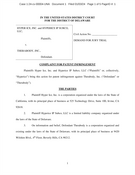-
Realtime Data LLC v. Kaminario, Inc. DC
-
1:19-cv-00350 Copied
- D. Del.
- Filed: 02/19/2019
- Docket updated daily
-
-
Realtime Data LLC v. Kaminario, Inc. DC
-
1:19-cv-00350 Copied
- D. Del.
- Filed: 02/19/2019
- Docket updated daily
-
